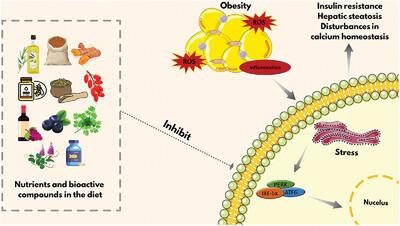当前位置:
X-MOL 学术
›
Mol. Nutr. Food Res.
›
论文详情
Our official English website, www.x-mol.net, welcomes your
feedback! (Note: you will need to create a separate account there.)
Unstressing the Reticulum: Nutritional Strategies for Modulating Endoplasmic Reticulum Stress in Obesity
Molecular Nutrition & Food Research ( IF 4.5 ) Pub Date : 2024-10-04 , DOI: 10.1002/mnfr.202400361 Michele Lima Brito, Karen Salve Coutinho-Wolino, Patricia Pereira Almeida, Pricilla de Castro Trigueira, Ana Paula de Paula Alves, D'Angelo Carlo Magliano, Milena Barcza Stockler-Pinto
Molecular Nutrition & Food Research ( IF 4.5 ) Pub Date : 2024-10-04 , DOI: 10.1002/mnfr.202400361 Michele Lima Brito, Karen Salve Coutinho-Wolino, Patricia Pereira Almeida, Pricilla de Castro Trigueira, Ana Paula de Paula Alves, D'Angelo Carlo Magliano, Milena Barcza Stockler-Pinto

|
The progression of obesity involves several molecular mechanisms that are closely associated with the pathophysiological response of the disease. Endoplasmic reticulum (ER) stress is one such factor. Lipotoxicity disrupts endoplasmic reticulum homeostasis in the context of obesity. Furthermore, it induces ER stress by activating several signaling pathways via inflammatory responses and oxidative stress. ER performs crucial functions in protein synthesis and lipid metabolism; thus, triggers such as lipotoxicity can promote the accumulation of misfolded proteins in the organelle. The accumulation of these proteins can lead to metabolic disorders and chronic inflammation, resulting in cell death. Thus, alternatives, such as flavonoids, amino acids, and polyphenols that are associated with antioxidant and anti-inflammatory responses have been proposed to attenuate this response by modulating ER stress via the administration of nutrients and bioactive compounds. Decreasing inflammation and oxidative stress can reduce the expression of several ER stress markers and improve clinical outcomes through the management of obesity, including the control of body weight, visceral fat, and lipid accumulation. This review explores the metabolic changes resulting from ER stress and discusses the role of nutritional interventions in modulating the ER stress pathway in obesity.
中文翻译:

释放网状压力:调节肥胖症内质网应激的营养策略
肥胖的进展涉及与疾病的病理生理反应密切相关的几种分子机制。内质网 (ER) 应激就是这样一个因素。在肥胖的情况下,脂毒性会破坏内质网稳态。此外,它通过炎症反应和氧化应激激活多个信号通路来诱导 ER 应激。ER 在蛋白质合成和脂质代谢中起着关键作用;因此,脂毒性等触发因素可以促进错误折叠蛋白质在细胞器中的积累。这些蛋白质的积累会导致代谢紊乱和慢性炎症,从而导致细胞死亡。因此,已经提出了与抗氧化和抗炎反应相关的替代品,例如类黄酮、氨基酸和多酚,通过施用营养物质和生物活性化合物来调节 ER 应激,从而减轻这种反应。减少炎症和氧化应激可以减少几种 ER 应激标志物的表达,并通过管理肥胖来改善临床结果,包括控制体重、内脏脂肪和脂质积累。本综述探讨了 ER 应激引起的代谢变化,并讨论了营养干预在调节肥胖 ER 应激通路中的作用。
更新日期:2024-10-04
中文翻译:

释放网状压力:调节肥胖症内质网应激的营养策略
肥胖的进展涉及与疾病的病理生理反应密切相关的几种分子机制。内质网 (ER) 应激就是这样一个因素。在肥胖的情况下,脂毒性会破坏内质网稳态。此外,它通过炎症反应和氧化应激激活多个信号通路来诱导 ER 应激。ER 在蛋白质合成和脂质代谢中起着关键作用;因此,脂毒性等触发因素可以促进错误折叠蛋白质在细胞器中的积累。这些蛋白质的积累会导致代谢紊乱和慢性炎症,从而导致细胞死亡。因此,已经提出了与抗氧化和抗炎反应相关的替代品,例如类黄酮、氨基酸和多酚,通过施用营养物质和生物活性化合物来调节 ER 应激,从而减轻这种反应。减少炎症和氧化应激可以减少几种 ER 应激标志物的表达,并通过管理肥胖来改善临床结果,包括控制体重、内脏脂肪和脂质积累。本综述探讨了 ER 应激引起的代谢变化,并讨论了营养干预在调节肥胖 ER 应激通路中的作用。


















































 京公网安备 11010802027423号
京公网安备 11010802027423号